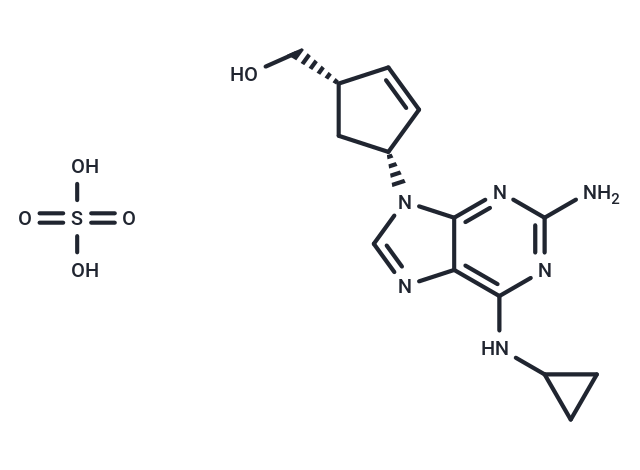Shopping Cart
- Remove All
 Your shopping cart is currently empty
Your shopping cart is currently empty

Abacavir monosulfate is an orally active, competitive nucleoside reverse transcriptase inhibitor that effectively inhibits HIV replication. Additionally, it exhibits anticancer properties in prostate cancer cell lines, and has the ability to penetrate the blood-brain-barrier and suppress telomerase activity [1] [2] [3].

| Pack Size | Price | Availability | Quantity |
|---|---|---|---|
| 5 mg | Inquiry | 35 days | |
| 10 mg | Inquiry | 35 days | |
| 25 mg | Inquiry | 35 days | |
| 50 mg | Inquiry | 35 days |
| Description | Abacavir monosulfate is an orally active, competitive nucleoside reverse transcriptase inhibitor that effectively inhibits HIV replication. Additionally, it exhibits anticancer properties in prostate cancer cell lines, and has the ability to penetrate the blood-brain-barrier and suppress telomerase activity [1] [2] [3]. |
| In vitro | Abacavir monosulfate, at concentrations of 15 and 150 μM, exhibits diverse biological activities against prostate cancer cell lines, including growth inhibition, cell cycle alteration, senescence induction, and modulation of LINE-1 mRNA expression over a period of 0-120 hours [1]. Furthermore, it significantly reduces cell migration and invasion after an 18-hour treatment period at the same concentrations [1]. Additionally, in cell proliferation assays involving the PC3, LNCaP, and WI-38 cell lines, abacavir demonstrated a dose-dependent inhibition of growth. Cell cycle analysis revealed a pronounced accumulation of cells in the S phase, with an observed increase in the G2/M phase for PC3 cells when treated with 150 μM for periods ranging from 0 to 120 hours. Both cell migration and invasion assays reported considerable reductions in these processes in PC3 and LNCaP cells treated with 15 and 150 μM for 18 hours [1]. Moreover, abacavir monosulfate has been shown to induce fat apoptosis [4]. |
| In vivo | Abacavir monosulfate administered in varying doses (0-7.5 μg/mL, 100 μL intrascrotally or 100 and 200 mg/kg orally for 4 hours) demonstrated a dose-dependent enhancement in thrombus formation [2]. Further, a combination treatment of Abacavir monosulfate (50 mg/kg/day) and Decitabine (0.1 mg/kg/day) via intraperitoneal injection for 14 days was found to inhibit tumor growth and extend survival in mice bearing high-risk medulloblastoma [3]. The first animal model utilized male C57BL/6 mice, either wild-type or P2rx7 homozygous knockout, aged 9-weeks and weighing 22-30 g, to study thrombosis [2]. The second model employed NSG TM mice implanted with patient-derived xenograft cells from Group 3 non-WNT/non-SHH or SHH/TP53-mutated medulloblastoma to assess the treatment’s efficacy on tumor growth and survival enhancement [3]. |
| Molecular Weight | 384.41 |
| Formula | C14H20N6O5S |
| Cas No. | 216699-07-9 |
| Storage | Powder: -20°C for 3 years | In solvent: -80°C for 1 year | Shipping with blue ice. |

Copyright © 2015-2025 TargetMol Chemicals Inc. All Rights Reserved.